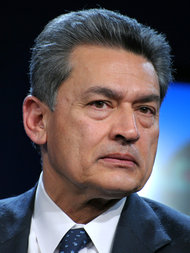 Eric Piermont/Agence France-Presse — Getty ImagesRajat K. Gupta.
Eric Piermont/Agence France-Presse — Getty ImagesRajat K. Gupta.
Lawyers for Rajat K. Gupta, a former director of Goldman Sachs charged with insider trading, filed a flurry of pleadings late Tuesday, seeking to dismiss counts, suppress wiretaps and force the government to clarify its indictment.
The filings outline the contours of Mr. Gupta’s defense as he prepares for a trial on April 9.
“The indictment reflects, and attempts to mask, the weakness of the case against Mr. Gupta,” his lawyers at Kramer Levin Naftalis Frankel wrote in their legal filing.
Mr. Gupta, 63, is the former head of the consulting firm McKinsey Company and, in addition to serving on Goldman’s board, was a director at Procter Gamble and AMR, the parent company of American Airlines. Described by his lawyers as “a self-made man who earned his sterling reputation through nearly 40 years as a global business leader and engaged philanthropist,” he is the most prominent businessman ensnared by the government’s widespread crackdown on insider trading.
In October, federal prosecutors charged him with five counts of securities fraud and one count of conspiracy for leaking Goldman and P.G.’s corporate secrets to Raj Rajaratnam, the former hedge fund manager serving an 11-year prison term after a jury convicted him of insider trading last spring.
On Tuesday, Mr. Gupta’s lawyers made three primary motions with the court seeking to buttress their client’s defense. In one, they asked for a dismissal of some of the five counts against Mr. Gupta.
“The indictment focuses on just two instances in which Mr. Rajaratnam is said to have traded on inside information he supposedly received from Mr. Gupta, but improperly uses those instances to create five purportedly separate substantive securities charges.”
A second filing asks the court to force the government to provide a “bill of particulars,” or a clarification of the indictment. Mr. Gupta’s lawyers say that the mountain of documents produced by the government during discovery — about 2.2 million pages and thousands of intercepted calls, with more to come — does not substitute for a bill of particulars.
A third court submission requests that Jed S. Rakoff, the presiding judge in the case, bar the government from using wiretap evidence against Mr. Gupta. Unlike the case against Mr. Rajaratnam, who ran the Galleon Group hedge fund, the government has no direct evidence, including telephone recordings, that showed Mr. Gupta engaged in insider trading. Instead, the government plans to build a case based on circumstantial evidence — like phone bills and trading records — to establish Mr. Gupta’s guilt.
Yet, there are at least two wiretapped conversations between Mr. Rajaratnam and his colleagues that, if used at trial, could be powerful evidence against Mr. Gupta. In one call, for instance, Mr. Rajaratnam tells a colleague, ”I heard yesterday from somebody who’s on the board of Goldman Sachs that they are going to lose $2 per share.”
Despite a judge’s refusal to bar the use of wiretaps in the Rajaratnam trial, Mr. Gupta’s lawyers argue that this ruling was incorrect. Mr. Rajaratnam’s lawyers are also expected to argue on appeal that the use of wiretaps against their client was unconstitutional.
A spokeswoman for the United States attorney’s office in Manhattan declined to comment.
Article source: http://feeds.nytimes.com/click.phdo?i=586d0d499e3ae4ce7fc49fe9ce553eb9